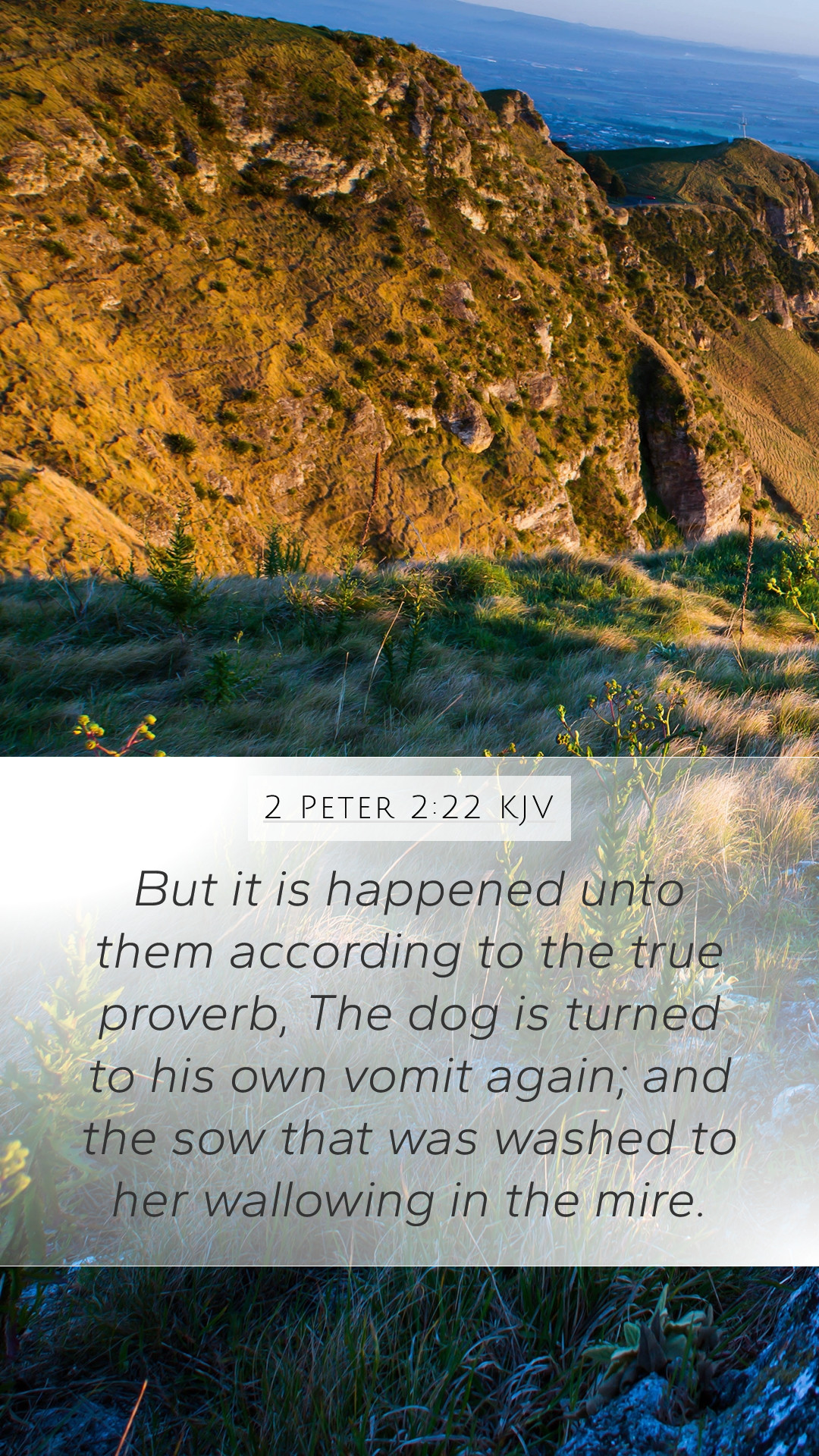Old Testament
Genesis Exodus Leviticus Numbers Deuteronomy Joshua Judges Ruth 1 Samuel 2 Samuel 1 Kings 2 Kings 1 Chronicles 2 Chronicles Ezra Nehemiah Esther Job Psalms Proverbs Ecclesiastes Song of Solomon Isaiah Jeremiah Lamentations Ezekiel Daniel Hosea Joel Amos Obadiah Jonah Micah Nahum Habakkuk Zephaniah Haggai Zechariah Malachi2 Peter 2:22 Meaning
What is the meaning of 2 Peter 2:22?
But it is happened unto them according to the true proverb, The dog is turned to his own vomit again; and the sow that was washed to her wallowing in the mire.
2 Peter 2:22 Bible Verse Meaning
Understanding 2 Peter 2:22: Insights and Commentary
Bible Verse: 2 Peter 2:22 - "But it has happened unto them according to the true proverb, The dog is turned to his own vomit again; and the sow that was washed to her wallowing in the mire."
Overview of the Verse
The verse under consideration presents a vivid illustration of the spiritual state of false teachers and those who reject the truth after having known it. Using the analogies of a dog returning to its vomit and a washed pig returning to the mud, Peter emphasizes the futility and disgrace of reverting to sinful behaviors and rejecting the transformative power of Christ.
Key Themes of 2 Peter 2:22
- The Nature of Sin: Both analogies highlight a return to pollution and filth, symbolizing the sinful nature and the tendencies of those who abandon their faith.
- Spiritual Reversion: The verse warns against the state of going back to a former, unclean way of living after experiencing redemption.
- Consequences of False Teachings: It reflects the dangers posed by false teachers who lead others into a similar state of spiritual regression.
Commentary Insights
Matthew Henry's Commentary
Matthew Henry emphasizes that this saying serves as a strong and alarming illustration. He interprets the ‘dog’ as symbolizing those who, after having tasted the grace of God, return to their sinful habits. It reflects a God-given truth about human depravity and the persistent tendency towards sin. He emphasizes that true repentance involves a genuine change of heart, which is contradicted by reverting to old behaviors.
Albert Barnes' Notes
Albert Barnes notes that the proverb denotes a disgraceful act. The verse serves as a profound caution against backsliding, suggesting that such an action is both shameful and destructive. Barnes elucidates that the washing represents the cleansing of sin, while returning to sin symbolizes a rejection of that cleansing and a severe disservice to the grace received.
Adam Clarke's Commentary
Adam Clarke takes the analogy further by discussing the significance of purification and the willful return to sin. He notes that the dog and the pig represent those who have been superficially cleaned but have not experienced genuine transformation. Clarke posits that one who returns to sin after experiencing divine mercy may find it increasingly difficult to return to grace, reflecting a deep-seated aversion to true repentance.
Practical Applications of 2 Peter 2:22
- Self-Examination: Believers are encouraged to introspect their lives to ensure they are not reverting to former sins.
- Importance of Accountability: Bible study groups can foster discussions around avoidance of backsliding.
- Understanding Grace: This verse challenges individuals to appreciate the depth of grace that comes with forgiveness and the seriousness of sin.
- Proactive Resistance to Temptation: Helps in reinforcing the need for vigilance against succumbing to old ways.
Cross References
- Proverbs 26:11: "As a dog returneth to his vomit, so a fool returneth to his folly."
- James 4:8: "Draw nigh to God, and he will draw nigh to you..." emphasizes the importance of drawing closer to God.
- Romans 6:1-2: Highlights the believer's relationship with sin and grace, advocating for living a new life in Christ.
- Hebrews 10:26-27: Warns against willfully continuing in sin after knowing the truth.
Conclusion
This analysis of 2 Peter 2:22 serves as a compelling reminder of the grave consequences of turning away from Christ after experiencing His goodness. The vivid metaphors employed by Peter are not only memorable but serve as a powerful warning against spiritual complacency and the dangers of returning to a lifestyle of sin. For anyone engaging in Bible study insights or seeking Bible verse understanding, this passage is vital to recognize the transformative nature of faith and the call to endure in the truth of God's Word.


